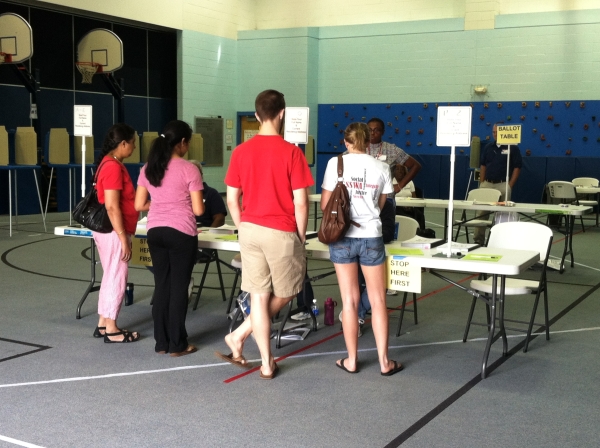On Election Day, as ballots are cast and the numbers tallied up, poll workers and voters won’t be the only ones quietly shuffling through gymnasiums, community centers and church basements. Party observers will also be stationed, silently, in these polling places, like the partisan guardians of election proceedings.
These observers, who are officially sanctioned by the Board of Elections, are tasked by their parties with ensuring that the election process is running as it should be. This means monitoring election officials as well as voters for any erratic behavior, determining whether any sort of voter intimidation or aggression is occurring, and noting whether or not long lines seem to be holding things up.
“We don’t expect it to be out of control,” said Dan Blue III, Chair of the Wake County Democrats. “Of course, we plan for the worst.”
The Wake County Republicans Party did not respond to email and phone calls requesting comment for this story.
Based on incidents reported both in 2008 and 2010, as well as in the primary election this year, Blue said the Wake County Democrats are concerned that people have been getting bad information, or are not aware of their rights in terms of voting.
While Cherie Poucher, director of the Wake County Board of Elections, couldn’t name any specific instances from past elections, she did say there are always varying degrees of overzealous campaigners.
“The campaigners always try to push the limits,” she said.
 [/media-credit]
[/media-credit]Saja Hindi
Voters cast ballots at Dillard Drive Elementary School during the spring primary election.
So while observers are watching out for overall trends at polling places, they’re also tasked with reporting back to their political parties. This is to ensure that those parties are getting accurate information, and are able to give the right advice back to the people at the polls.
These observers follow strict codes, however. While they are allowed in the voting enclosure and can watch ballots and computer operators, they are only allowed to step out at set times to report back to their parties. Site officials can even determine if an observer is taking too many bathroom breaks.
Blue said this is the reason the Democratic Party of Wake County typically uses lawyers as their first line at the polls. While all observers must be trained using materials certified by the Board of Elections prior to entering the polling place, lawyers are already largely familiar with the law.
And Blue made it clear that observers are never to get in the way of the process.
“The role of the observer is just that, it’s to observe,” he said. “It is ultimately up to the precinct judge to take the right action. We’re confident that that system works.”
That system requires the site supervisor for each polling place to address any situation brought to their attention, according to Poucher. Both political parties are then emailed about the complaints.
While Poucher pointed out that anything beyond the 50-foot buffer zone around polling places is technically out of the Board of Elections’ control, she said site officials would still attempt to calm the situation. If it was something that proved threatening, then they would call law enforcement.
As Blue stated, the observers job is “to make sure that nothing is preventing the people who are supposed to be doing their jobs from doing their jobs, and to be sure that nothing is keeping the people who are eligible to vote from voting.”
If there’s something that does seriously impede those two levels of the process, then that information is aggregated, reported to the right people, and if necessary, legal measures are taken from there.
